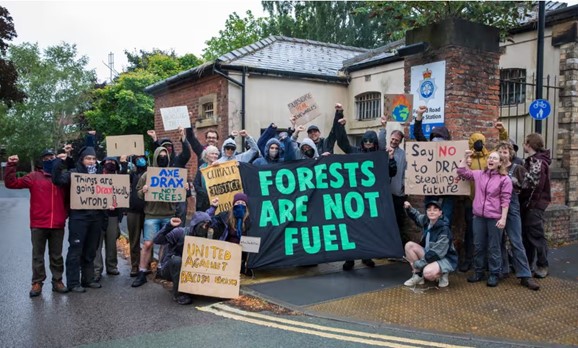
Climate Activists Accuse Police of Acting as "Private Security" for Drax Power Station
Greenpeace and nearly 150 other groups have expressed outrage, accusing the police of acting as "private security" for Drax power station, the UK's largest carbon emitter. The accusations follow the preemptive arrests of several activists, which led to the cancellation of a planned climate protest camp near the facility.
In a statement, the groups condemned the police operation as an "unreasonable restriction of free speech." The arrests, which occurred just before the protest was set to begin, prevented the activists from highlighting the environmental impact of the wood-burning power station.
This incident places additional pressure on the Labour government as it grapples with the future of Drax. Despite contributing roughly 3% of the UK's carbon emissions, the power station is classified as "renewable" and receives approximately £2 million daily in green energy subsidies.
Activists from the group Reclaim the Power had planned a five-day camp near Drax, located in Selby, North Yorkshire, to draw attention to the station's environmental footprint. However, on the eve of the protest, police arrested 25 individuals and confiscated essential items, such as tents, fire safety equipment, and wheelchair-accessible flooring. These actions, according to activists, made it impossible for the camp to proceed.
North Yorkshire police defended their actions, stating they acted "swiftly and robustly to reduce the risk of unlawful activity." However, environmental groups were outraged, especially as these arrests occurred while the country was dealing with violent anti-immigration riots elsewhere.
The groups argue that the police's actions have diverted resources from more pressing matters and have prevented citizens from expressing legitimate concerns about how public funds are spent. "Gathering at a camp to express these views is not a crime. Police taking equipment to prevent this camp from going ahead is an unreasonable restriction of free speech and is highly oppressive," the groups stated.
The controversy comes at a critical time for Ed Miliband, the Secretary of State for Energy Security and Net Zero, who must decide on the future of Drax. The power station, originally built as a coal-fired facility and later converted to burn wood, emitted around 11.5 million tonnes of CO2 last year. Despite this, wood, or biomass, is considered a renewable fuel, making the station eligible for substantial subsidies. However, the long-term environmental impact of biomass burning has raised concerns among scientists and activists.
With current subsidy arrangements set to expire in 2027, Drax is seeking additional public funds to equip its biomass boilers with carbon capture and storage (CCS) technology. While this could reduce carbon emissions, it does not address concerns about the sustainability of biomass sourcing. Many experts argue that subsidizing Drax is not cost-effective. Frankie Mayo, an analyst at the Ember think tank, criticized the subsidies, stating, "Burning wood pellets can be as bad for the environment as coal. Supporting biomass with subsidies is a costly mistake."
In response, Drax highlighted its significant tax contributions, claiming to have paid £238 million in taxes so far in 2024. The company dismissed the Ember report as "flawed" and emphasized its role in generating around 8% of the UK's renewable electricity. Drax also plans to invest billions in developing bioenergy with carbon capture and storage (BECCS) units, which could create up to 10,000 jobs. According to Drax, BECCS is the only credible large-scale solution for generating secure renewable power while achieving carbon removals.